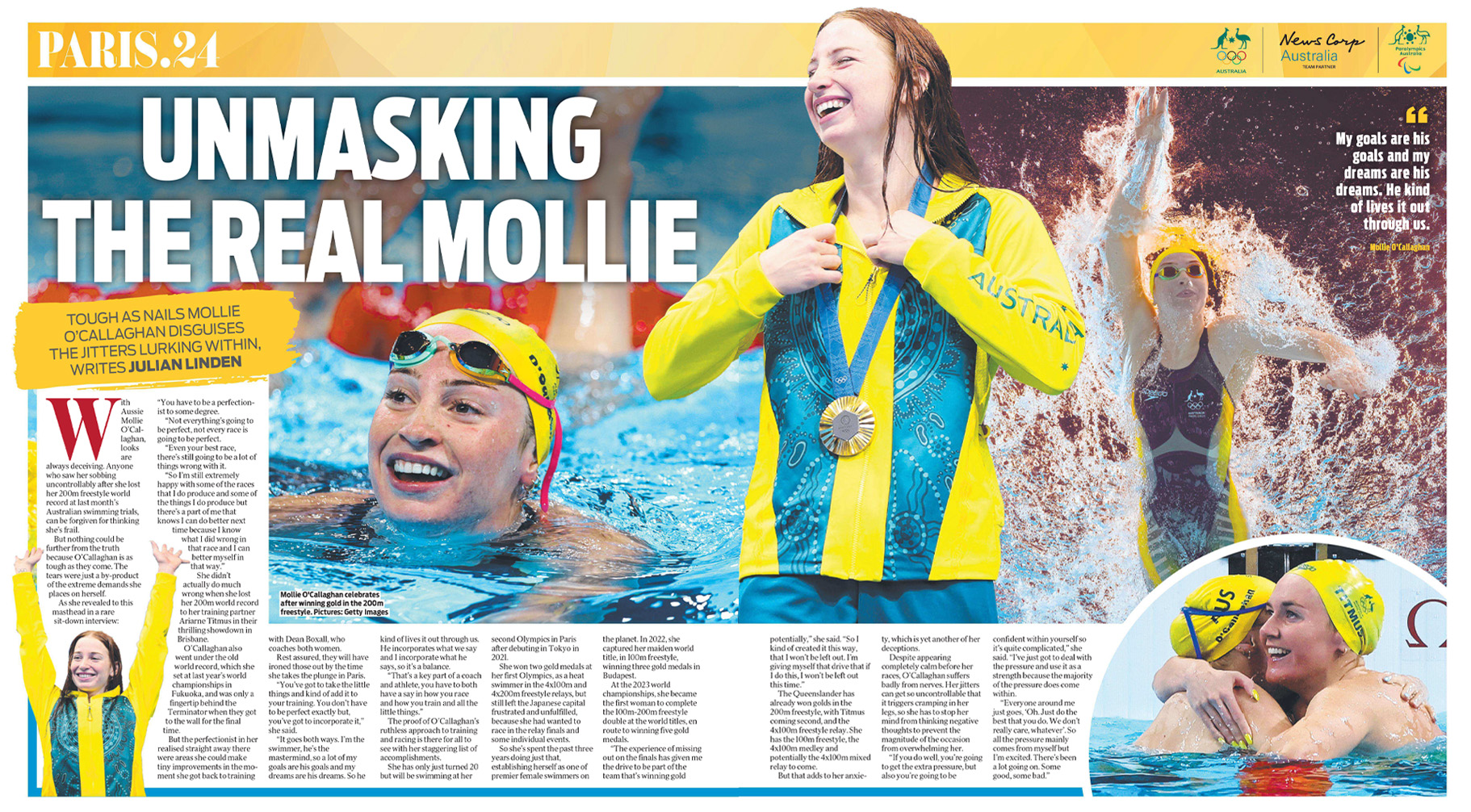
Article by Julian Linden, courtesy of Herald Sun.
With Aussie Mollie O’Callaghan, looks are always deceiving. Anyone who saw her sobbing uncontrollably after she lost her 200m freestyle world record at last month’s Australian swimming trials, can be forgiven for thinking she’s frail.
But nothing could be further from the truth because O’Callaghan is as tough as they come. The tears were just a by-product of the extreme demands she places on herself.
As she revealed to this masthead in a rare sit-down interview: “You have to be a perfectionist to some degree. “Not everything’s going to be perfect, not every race is going to be perfect.
“Even your best race, there’s still going to be a lot of things wrong with it.
“So I’m still extremely happy with some of the races that I do produce and some of the things I do produce but there’s a part of me that knows I can do better next time because I know what I did wrong in that race and I can better myself in that way.”
She didn’t actually do much wrong when she lost her 200m world record to her training partner Ariarne Titmus in their thrilling showdown in Brisbane.
O’Callaghan also went under the old world record, which she set at last year’s world championships in Fukuoka, and was only a fingertip behind the Terminator when they got to the wall for the final time.
But the perfectionist in her realised straight away there were areas she could make tiny improvements in the moment she got back to training with Dean Boxall, who coaches both women.
Rest assured, they will have ironed those out by the time she takes the plunge in Paris.
“You’ve got to take the little things and kind of add it to your training. You don’t have to be perfect exactly but, you’ve got to incorporate it,” she said.
“It goes both ways. I’m the swimmer, he’s the mastermind, so a lot of my goals are his goals and my dreams are his dreams. So he kind of lives it out through us.
He incorporates what we say and I incorporate what he says, so it’s a balance.
“That’s a key part of a coach and athlete, you have to both have a say in how you race and how you train and all the little things.”
The proof of O’Callaghan’s ruthless approach to training and racing is there for all to see with her staggering list of accomplishments.
She has only just turned 20 but will be swimming at her second Olympics in Paris after debuting in Tokyo in 2021.
She won two gold medals at her first Olympics, as a heat swimmer in the 4x100m and 4x200m freestyle relays, but still left the Japanese capital frustrated and unfulfilled, because she had wanted to race in the relay finals and some individual events.
So she’s spent the past three years doing just that, establishing herself as one of premier female swimmers on the planet. In 2022, she captured her maiden world title, in 100m freestyle, winning three gold medals in Budapest.
At the 2023 world championships, she became the first woman to complete the 100m-200m freestyle double at the world titles, en route to winning five gold medals.
“The experience of missing out on the finals has given me the drive to be part of the team that’s winning gold potentially,” she said. “So I kind of created it this way, that I won’t be left out. I’m giving myself that drive that if I do this, I won’t be left out this time.”
The Queenslander has already won golds in the 200m freestyle, with Titmus coming second, and the 4x100m freestyle relay. She has the 100m freestyle, the 4x100m medley and potentially the 4x100m mixed relay to come.
But that adds to her anxiety, which is yet another of her deceptions.
Despite appearing completely calm before her races, O’Callaghan suffers badly from nerves. Her jitters can get so uncontrollable that it triggers cramping in her legs, so she has to stop her mind from thinking negative thoughts to prevent the magnitude of the occasion from overwhelming her.
“If you do well, you’re going to get the extra pressure, but also you’re going to be confident within yourself so it’s quite complicated,” she said. “I’ve just got to deal with the pressure and use it as a strength because the majority of the pressure does come within.
“Everyone around me just goes, ‘Oh. Just do the best that you do. We don’t really care, whatever’. So all the pressure mainly comes from myself but I’m excited. There’s been a lot going on. Some good, some bad.”















